If humans want to really make a go at leaving Earth and living in space or on other planets, we’re going to have to figure out a lot of things: spaceships, food supplies, fuel, how to keep everybody from killing one another. But one thing seems to be frequently left out of the picture, when it comes to distant space travel research: reproduction. It turns out we know very, very little about what pregnancy in space might look like, or whether it’s even possible at all.
Guests
- Maggie Koerth-Baker: senior science writer at FiveThirtyEight
- Kim Stanley Robinson: science fiction author of the Mars trilogy, The Years of Rice and Salt, 2312, Aurora and others, including a new book Red Moon.
- Anicca Harriot: PhD student at the University of Maryland School of Medicine, advocate for STEM outreach
Further Reading
- Space Sex is Serious Business
- Microgravity alters protein phosphorylation changes during initiation of sea urchin sperm motility.
- Mammalian Development in Space
- Sea Urchin Eggs under Microgravity Conditions
- Pilot and astronaut offspring: possible G-force effects on human sex ratio.
- Sex Ratio Shift in Offspring of Male Fixed-Wing Naval Aviation Officers
- Orbital Spaceflight During Pregnancy Shapes Function of Mammalian Vestibular System
- Physiology of a Microgravity Environment Selected Contribution: Effects of spaceflight during pregnancy on labor and birth at 1 G
- Effects of Gravity, Microgravity or Microgravity Simulation on Early Mammalian Development
- What Going to Mars Will Do to Our Bodies
Flash Forward is produced by me, Rose Eveleth. The intro music is by Asura and the outtro music is by Hussalonia. The episode art is by Matt Lubchansky.
If you want to suggest a future we should take on, send us a note on Twitter, Facebook or by email at info@flashforwardpod.com. We love hearing your ideas! And if you think you’ve spotted one of the little references I’ve hidden in the episode, email us there too. If you’re right, I’ll send you something cool.
And if you want to support the show, there are a few ways you can do that too! Head to www.flashforwardpod.com/support for more about how to give. But if that’s not in the cards for you, you can head to iTunes and leave us a nice review or just tell your friends about us. Those things really do help.
That’s all for this future, come back next time and we’ll travel to a new one.
FULL TRANSCRIPT BELOW
▹▹ ▹▹ ▹▹ ▹▹ ▹▹ ▹▹ ▹▹ ▹▹ ▹▹ ▹▹ ▹▹ ▹▹ ▹▹ ▹▹ ▹▹ ▹▹ ▹▹ ▹▹ ▹▹ ▹▹ ▹▹ ▹▹ ▹▹
Hello and welcome to Flash Forward! I’m Rose and I’m your host. Flash Forward is a show about the future. Every episode we take on a specific possible… or not so possible future scenario. We always start with a little field trip to the future, to check out what’s going on, and then we teleport back to today to talk to experts about how that world we just heard might really go down. Got it? Great!
This episode we’re starting in the year 2123.
***
[shuffling sounds, beeping]
[ding]
Computer Medical Assistant: Good morning Sarah. How are you feeling?
Woman: groan
[ding]
Computer Medical Assistant: That doesn’t sound so good eh. Let’s do a bit of a check – in. Please insert your hand into the medical analyzer.
[shuffling]
[ding] Thank you. I’m going to do a quick blood draw, okay?
Great, please stand by while I process your test results.
[moving away]
[muffled puking sound]
[ding] I hear that you are experiencing nausea and vomiting. I will add that to the write up. Please stand by.
[ding] In order to complete this diagnostic I will need a urine sample. [slide] Please remove the urine sample kit from the medical drop slot now [ding]. Thank you. Please return the sample in the next 10 minutes.
[more shuffling, tinkling] [slide] [ding]
[ding] Thank you Sarah. Please stand by.
[ding] Thank you for your patience Sarah. I have a diagnosis for you. Please be seated near the medical analyzer. [shuffling]
Thank you. As a reminder, your medical information is private to you and you alone, and I am prohibited from sharing diagnoses with the ship’s medical team unless your condition poses a threat to other passengers. If you would like to seek further medical treatment you may access the ship’s doctors at any time. Do you understand?
Woman: Yes
[ding]
Computer Medical Assistant: Thank you. My diagnostics indicate that you may be pregnant.
I have no protocol in my system for whether or not cases of pregnancy should be reported to the medical team on board. Do you want me to share this information with them?
Woman: No.
[ding]
Computer Medical Assistant: Very well. The information will be contained in your file. Is there anything I can do to make you more comfortable?
Woman: What can you tell me about pregnancy in space.
[ding]
Computer Medical Assistant: One moment please.
Unfortunately very little. Here is a list of scholarly articles I could find related to gestation and pregnancy in space. None of them are in humans, I’m afraid. Only fish, mice and sea urchins. Would you like me to read these papers to you?
Woman: Yes, please
Computer Medical Assistant: Okay, let’s begin with Orbital Spaceflight During Pregnancy Shapes Function of Mammalian Vestibular System by April E. Ronca, Bernd Fritzsch, Laura L. Bruce, and Jeffrey R. Alberts published in Behavioral Neuroscience in February of 2008.
Abstract: Pregnant rats were flown on the NASA Space Shuttle during the early developmental period of their fetuses’ vestibular apparatus and onset of vestibular function. The authors report that prenatal spaceflight exposure shapes vestibular-mediated behavior and central morphology. Postflight testing revealed (a) delayed onset of body righting responses, (b) cardiac deceleration (bradycardia) to 70° head-up roll, (c) decreased branching of gravistatic afferent axons, but (d) no change in branching of angular acceleration receptor projections with comparable synaptogenesis of the medial vestibular nucleus in flight relative to control fetuses. Kinematic analyses of the dams’ on-orbit behavior suggest that, although the fetal otolith organs are unloaded in microgravity, the fetus’ semicircular canals receive high levels of stimulation during longitudinal rotations of the mother’s weightless body. Behaviorally derived stimulation from maternal movements may be a significant factor in studies of vestibular sensory development. Taken together, these studies provide evidence that gravity and angular acceleration shape prenatal organization and function within the mammalian vestibular system.
[[fade out]]
[ding] Good morning Sarah. How are you feeling this morning?
Woman: Tired but… okay. Kind of achey?
[ding]
Computer Medical Assistant: Any more nausea?
Woman: No, thank god.
Computer Medical Assistant: Excellent.
[ding] I have some information for you.
[ding] I found a new resource about pregnancy in space. A scholar on Earth named Gloria Talbott recently published a guide for expectant mothers on Mars. It is not quite the same conditions as this ship, but perhaps it could be useful to you?
I will read it to you now.
Woman: Thank you, yes, what does it say?
Computer Medical Assistant: Having a baby is one of the most joyous times in many women’s lives. From anticipating the day you’ll bring your little one home, to picking a name and nursery colors, the excitement is palpable. All the more exciting that you will be one of the very first humans to have a baby on Mars.
But no matter how well you plan for their arrival, you may not be fully prepared for all of the changes your body will go through now. Knowing what to expect will help you get ready for the months ahead.
Pregnancy is different for every woman, here are some of the changes you might experience, what they mean, and which signs warrant a call to your doctor.
Number one: Bleeding. About 25% of pregnant women on Earth experience slight bleeding during their first trimester. Because miscarriage rates are estimated to be 80% higher in space, it is important to keep an eye on this bleeding. Anything more than light spotting is worth seeing a doctor about.
Number two: Frequent urination . Your baby is still pretty small, but your uterus is growing and it’s putting pressure on your bladder. Remember, in microgravity your body doesn’t provide the same signals as on Earth so you will not feel this pressure the same way you might on Earth. It’s worth doubling your timed bathroom breaks just in case.
Are you still listening? Should I continue?
Woman: No… that’s enough for now.
Computer Medical Assistant: Okay
[fade out]
Good morning Sarah. How are you feeling this morning?
Woman: Uh, not good? What does labor feel like?
Computer Medical Assistant: Oh my. I will search.
[ding] I found a resource online for you, article, “Labor: What it feels like” from baby center. Would you like me to read it to you?
Woman: okay?!
Computer Medical Assistant: My contractions were like menstrual cramps on steroids.
It was like gas pains times a thousand.
The contractions felt like my whole body was clenching.
Having contractions felt like being hit with something really hard.
It felt like I was being impaled on a hot fireplace poker.
Women: Stop… stop. Call the medical team.
Computer Medical Assistant: Calling in the medical unit.
[baby cries]
[fade out]
Rose: Okay! So this episode we’re talking about pregnancy in space. What happens when we actually start sending people to live on Mars or in space stations for a long time, like, generations. This is… very obvious, but space is not like Earth! And being in space does a lot of weird stuff to the human body, because the human body was, pretty obviously, not designed to be there.
And the two main things we’re going to talk about when it comes to human physiology in space are radiation and microgravity. Let’s start with radiation.
Maggie Koerth Baker: So when we talk about radiation in space, we are talking about subatomic particles that are just kind of flying around in space, and they’re moving really quickly, and they can basically slam through your body like a bowling ball going through some pins.
Rose: This is Maggie Koerth Baker, a senior science reporter at 538 dot com. On Earth, the magnetic field of the planet protects us from most of the radiation that’s flying around in space; all those teeny tiny bowling balls. But in space, you don’t have that protection.
Maggie: So if you are spending a lot of time outside of Earth’s magnetic field, you’re going to be exposed to a lot more radiation damage. Which means that your DNA is going to be exposed to a lot more bowling balls, effectively.
Anicca Harriot: So on the international space station, being there for six months, you’re exposed to the same amount of radiation that you would be exposed to over 40 years on earth.
Rose: This is Anicca Harriot, a PhD student at the University of Maryland School of Medicine, studying biochemistry and molecular biology. And while some people, like Elon Musk, have poo-pooed the dangers of radiation to future space travelers, the science is pretty clear that radiation is not good for the body.
Anicca: Some of the things that we are concerned about is the fact that radiation is damaging to DNA. And so, worst case scenario, you have higher occurrence of cancer, for example.
Rose: Anicca’s research also looks at how radiation also changes the internal chemistry of cells. It turns out that radiation can actually increase the amount of something called “reactive oxygen” inside cells.
Anicca: Which is exactly what it sounds like; its compounds that have oxygen in them that are highly reactive within the cell. And having those laying around is kind of like creating a minefield for the cell.
Rose: More reactive oxygen means more damage to DNA and RNA, and can also increase the rate of cell death. Some studies have shown a correlation between more reactive oxygen and things like hearing impairment, cardiovascular disease, heart attack, stroke…
Anicca: Muscle wasting, osteoporosis, osteopenia, which are just loss of bone diseases. And also muscular dystrophy. And so, the things that we see in the cellular processes that happen in cells with those disease processes are very similar to what happens to astronauts when they’re in space.
Rose: Then there’s microgravity.
Maggie: That whole thing where the astronauts are floating around, and it looks like Cirque du Soleil that they’re all wearing polo shirts – that is microgravity that you’re looking at.
Rose: Microgravity makes for some very entertaining videos of things like floating balls of water, skittles, and what happens when you wring out a washcloth in space. But it also does weird stuff to the human body.
Anicca: I love dealing with questions of microgravity, because you kind of get to think about something that other scientists take for granted in their experiments. Which is just what happens when there’s no gravity?
Rose: Studies on embryonic stem cells have shown that when in microgravity, 64 percent of the proteins inside those space cells are different than the ones grown in normal Earth gravity. 64 percent! Studies also show that the proteins that these space cells did have were more likely to be ones that degrade bones. Plus, without gravity pushing on us all the time, the muscles and bones in the human body don’t have to work as hard to keep you moving around.
Anicca: And then when you’re in space, your muscle and bone begins to deteriorate, because it no longer has that resistance to fight constantly. So it’s breaking down.
Rose: And it’s not just muscle and bone that changes without constant pressure and use.
Anicca: You also see a shift in fluids in the body as well.
Rose: On Earth, your heart is constantly working to pump blood up towards your head, which is important because your brain is up there. And on Earth your heart is constantly fighting gravity, which wants to bring your blood down. So it’s pumping away to make sure the little loaf of pink sludge inside your skull can keep working.
Anicca: When you’re in space, that doesn’t happen. And so you get… astronauts will have like a puffy face when they come back to Earth after long duration space missions. And that’s because the fluid that’s normally having to work to push itself up kind of just sits there when they’re in space.
Rose: Astronauts do a whole bunch of stuff to try and combat these things. They wear compression suits and have a really rigorous exercise routine to try and keep their muscles from atrophying. But even with all of that, when astronauts come back down from space they often have weird symptoms. Here’s astronaut Scott Kelly, testifying in front of Congress about what happened to him when he came back from 340 days in space. Kelly had previously spent 100 days in space, but he says that his 340 day mission was really different.
Scott Kelly: My muscles more quickly stiffened, and because my skin had not touched anything for nearly a year, it was extremely sensitive and became inflamed. I developed a hive-like rash on every surface of my skin that came in contact with ordinary surfaces on Earth during normal activities like sitting or lying in bed. My legs were swollen due to the fluid shift imposed on my body by gravity. I even had flu-like symptoms that appear to have been a result from my extended time in space.
Rose: Kelly’s experience represents basically the main way we learn about the body in space — we send people up there. We can do experiments in labs, and those are definitely important, but there’s no way to really know what happens to a whole human body in space without… trying it. Which means that in some ways what we can know about the human body in space is dictated by the human bodies we have sent to space.
To date, about 561 people have gone to space, depending on how you define it, and only 61 of them have been women. Today, women that go are almost all taking some kind of birth control that prevents them from having a period in space. And they are never sent into space when pregnant.
Anicca: Female astronauts are tested regularly in the, about a week and a half leading up to when their mission launches, to make sure that they are not pregnant before they go into space
Rose: So… when it comes to human pregnancy in space… we really know very, very little. In fact, sometimes NASA claims that it’s not doing any research on this entire element of human biology.
Maggie: There’s a 2007 article I found in Slate where I think they told people that nobody did animal research on sex in space, which is demonstratively false.
Rose: In reality, NASA has done research on pregnancy in space. Not a ton of it, but some. But they don’t like talking about it.
MAggie: They are a little embarrassed about it. Then they don’t necessarily want to be associated with space sex research for political reasons, which makes sense. You know, when you’re getting your funding from Congress and you have to deal with the reality of Congress.
Rose: Every year Oklahoma Senator Tom Coburn releases what he calls the “Wastebook,” in which he compiles 100 examples of government spending that he finds outrageous. Often, that spending involves research that, it seems Coburn does not actually understand. Despite this report being wildly misinformed, the last thing any scientist wants is their research showing up in one of Coburn’s presentations. And it would be pretty easy for someone like Coburn, who, for the record, doesn’t believe in climate change and is opposed to abortion, same-sex marriage and embryonic stem cell research, to find research on reproduction in space outrageous.
Maggie: You don’t want to have your projects be hauled out as this kind of prurient – you know, nudge nudge, wink wink, look everybody’s banging in space – stuff, and I get that. I 100 percent get it. But I also am sort of frustrated by it, because it is clearly something that is important, right? If we want to achieve these goals that we have about making space a part of the human community; even if we’re just talking about, not even people living there, but people working there, people spending more time there than short jaunts of six months, eight months for research purposes, you kind of need to know this stuff.
Rose: For the record, I reached out to a handful of NASA officials asking for comment on this, including Dr. April Ronca, who is the researcher who has published the most on this topic, and I never heard back.
So we don’t know much, but we do know a few things about pregnancy in space.
Maggie: There have been a number of different studies with a range of animals. Five species that I could find peer reviewed documentation for, including amoebas, including rats, including fish.
Rose: So let’s walk through what we know, or at least what’s been studied, starting from the beginning. Or even, before the beginning. Birth control, it might need to be different in space.
Maggie: There is some evidence that birth control pills might not maintain their effectiveness in the face of space radiation, and long term trips to places like Mars. These pills are getting bombarded with radiation, just like the body is. So we don’t even necessarily know whether we have great ways to prevent pregnancy in space.
Rose: On the other hand, we might not need birth control at all. It turns out that it’s totally not a given that humans could get pregnant in space. In fact, there is some research to suggest that we might not be able to.
Maggie: It looks like microgravity has some really big impacts on hormone levels, in both male and female rats. And also could be resulting in loss of the corpus luteum.
Rose: The corpus luteum, which fun fact, means yellow body in Latin, is a bundle of cells that forms in the ovary after a female mammal ovulates. And its job is to produce a bunch of the hormone progesterone. And progesterone is a super important hormone in pregnancy.
Maggie: Without that you can get pregnant, but the pregnancy wouldn’t be likely to stick.
Rose: And in fact, researchers have had trouble getting mammals pregnant in space. In a couple of experiments in the 1970’s,
Maggie: Russian scientists launched this satellite that had male and female rats on board. Basically gave them the opportunity to mingle, beginning a couple of days into the space trip. And they ended up with… nobody had babies.
Rose: There have been studies where fish and sea urchins eggs have been effectively fertilized in space, but their reproductive system is obviously really different from ours. In all of the studies I’ve seen that involve pregnant mammals in space, the researchers got the animals pregnant back on Earth and then sent them up. There have been studies in labs that simulated microgravity conditions, and in some of those they were able to get a mouse embryo to develop, but in other labs they weren’t. Again, this is all really early research, and there isn’t a lot of it. But it could be that getting a human pregnant in space… is not possible. Or at least very, very unlikely.
Maggie: I have thought, in the past, about what is the story of reproduction in space, if you’re telling a story. And I think it’s less labor than it is miscarriage
Rose: There are a lot of technical challenges that face us, when it comes to escaping Earth. There are questions of engineering, and fuel sources, and landing gear, and then of course all the stuff that has to happen once you get to a place like Mars. But there are also a lot of social challenges too. How do we make sure that the people on these missions are not just physically healthy, but mentally healthy. How do we make sure that they don’t kill each other? Or spiral into horrible depression? And if it’s true that the vast majority of pregnancies in space will end in miscarriage, which is a horrible and emotionally devastating thing, that’s… going to really complicate the question of mental health in space.
Then again, it’s possible that the way radiation impacts our hormones will lessen the blow of a miscarriage, too.
Maggie: If your hormone levels are that affected, I don’t… would it be as distressing? Like, I just don’t know. I’m speaking right now as somebody who’s had multiple miscarriages. A huge part of the distress of that is the hormones building up, and it’s like BAM gone in a couple of days. And your body just kind of floods out tears and emotions. But I don’t know. I don’t know how microgravity altered hormones would be affected in that way?
Rose: Again, we don’t know. We really have no idea. But if it’s true that getting a human pregnant in space is going to be incredibly difficult, that’s sort of a problem if we want to develop communities off Earth in the future. At least assuming that we don’t have artificial wombs by then.
Kim Stanley Robinson: And if it doesn’t work then, the whole space project as a place where we actually go and live as opposed to a place that we visit and study and go back home to Earth, is on the table with that one question.
Rose: This is Kim Stanley Robinson, a science fiction author who’s written a ton of books including The Mars trilogy, 2312, Aurora, and more. And he has a new book out now called Red Moon, which involves a character getting pregnant on the moon. Which, gets her into trouble.
Stan: There’s a ban on that, on getting pregnant on the moon, that the Chinese government has put out, just as a kind of a safety issue.
Rose: And when we come back we’ll hear more from Stan about the book, and continue on through the potential gestational cycle of a space baby. But first, a quick break.
BREAK
Okay so let’s say, for the sake of the rest of this episode, that humans can get pregnant in space. What happens next? This is one of the elements in Kim Stanley Robinson’s new book Red Moon.
Stan: Red Moon is about China, and it’s about China occupying the moon in a substantial way before anybody else. And it takes place about 30 years from now.
Rose: The book centers on two main characters, Fred, who’s an engineer, and Chan Qi.
Stan: Chan Qi is a young woman, and they call them princelings in China, which is to say the children of top party officials. She loves her father, but she is also working to improve China’s lot from her own angle, which makes her kind of a dissident leader of sorts.
Rose: So Chan Qi is a radical, working to try and make China better, in her opinion at least. And while she was on the moon, she managed to get pregnant.
Stan: The novel doesn’t go into how she got pregnant, who she got pregnant with, or why she did. This is sort of something that she doesn’t want to talk about, and we don’t have any access to her background as readers.
Rose: Stan was inspired to include this bit of the story, in part, because many of his other books center around space, and space travel. And in doing background reading for those books, he came across some of the scientific research we talked about earlier in the episode. Or really, the lack thereof.
Stan: There’s been this constant talk, ever since I wrote my Mars trilogy, about “can it really happen?” And there are various questions that come up when we talk about the long term human inhabitation of Mars, or anywhere in space, including the rest of the solar system. And when I was writing 2312, that was all back on the table for me. And biological issues in 2312 are a really big deal. And one of the unknowns is pregnancy and fetal development.
Rose: One of the things Stan and I talked a lot about was how the first pregnant person in space might happen. Will it be an official experiment, or will it be… by accident? Because when you put people together for long periods of time… that stuff happens. It’s hard to say whether we’re more likely to see an institution like NASA get a volunteer for this, or whether a company like SpaceX will beat them to it by accident. I’m actually inclined to guess that latter. Because when you think about it, doing this experiment officially, is tricky.
Stan: You’re risking yourself perhaps, but you’re risking somebody else’s brain development. Let’s put it flatly right at the cutting edge of health… would you harm your baby?
Rose: On Earth we already can’t do experiments to study certain things about pregnancy, because they’re not ethical.
Maggie: You can’t you can’t make people drink a crap ton of coffee and some people not drink a crap ton of coffee and see what the result is.
Rose: If you think Congress might be annoyed by pregnant rat research, can you imagine telling them that someone is going to risk a human baby? Women on Earth right now are not allowed to make decisions about what happens to bundles of cells inside of them. Any future space baby will be inherently politicized. I think it would become a total nightmare circus. And it’s absolutely the kind of nightmare circus that NASA would love to avoid.
That doesn’t mean, to be clear, that some women wouldn’t readily volunteer for this kind of mission. The Mars ONE mission, which is a one way trip — which means you die on Mars, you never come back — got 80,000 sign ups in just two weeks. Obviously not every single one of those 80,000 people would actually go through with it, but if even 10% of them did, that’s… still a lot of people willing to volunteer for something like this.
Stan: There’s going to be some women astronauts for whom space is a religion and a cause. And they might be willing to damn the torpedoes, full speed ahead, and be convinced in advance that their kids are going to be all right, and want to prove it to the world as part of making the case that space is a viable home for humanity.
Rose: There’s no official NASA rule that bans sex in space, fun fact. Although the NASA party line is that it definitely has never happened. But it’s possible that some future astronauts could… take matters into their own hands?
Stan: There’s a story there for some science fiction writer to tell. And for some set of astronauts to live; to deliberately get pregnant in space, have children on the moon, as a proof of concept.
Rose: Either way, once you start putting a ton of people up into space, whether you want there to be a pregnancy experiment or not, there’s going to be one.
Stan: I wouldn’t be surprised if the first thing that we’ll get is not a regulated experiment but a breaking of some kind of a norm to give it a try.
Rose: Which brings us back to following along the gestational period of our future space baby. So, we’ve gotten pregnant. Now what. Well, microgravity is still there, making things weird! Without strong gravity, certain systems in the body don’t develop the same way they might on Earth. There are some studies from the 70’s and 80’s that show that in chicks and frogs gravity is what determines the symmetry of the embryo. Without it, the fetus doesn’t develop symmetrically.
Microgravity has also been shown to impact the development of something called the vestibular system.
Maggie: The vestibular system is kind of this organ in your ear that basically helps you maintain balance when you walk.
Rose: This is the system that allows you to, as Cardi B says,
Cardi B: Knock me down nine times but I get up ten
Yeah but I get up ten
Knock me down nine times but I get up ten
Rose: When scientists sent 10 pregnant rats up on a NASA Space Shuttle and then brought them back down to Earth to give birth, they found that being in space impacted the development of this balance system in the babies. Rat babies that were gestated in space were significantly slower to get up after being knocked down than rat babies gestated on Earth.
Maggie: I mean, you think about somebody who has vertigo. And all of the very different symptomatological impacts that vertigo can have on the human body. Well, you know, imagine that, but that’s been what you’ve stuck with since conception and development.
Rose: So the babies that are born in space might have their organs flipped inside their bodies, and constant vertigo. But what about… actually giving birth to those babies? After nine months of being pregnant in space, while microgravity and radiation are impacting the development of the fetus inside you, what happens when you have to actually push that baby out?
Again, we don’t know. But it’s possible that microgravity might make this weird too. For example, here’s my favorite fact about microgravity and the human body: did you know that astronauts basically never feel like they have to pee? So, on Earth, when you’re in line for the bathroom and you’re doing the pee dance because your body is like “HELLO YES I HAVE TO PEE RIGHT NOW” that happens because there are nerves that line the bladder, and those nerves are stretch receptors. In Earth gravity, the urine in your bladder pools at the bottom and tug the bladder down, like if you fill a balloon with some water and it stretches the balloon down out a little bit. And that stretching makes the receptors fire, and creates that “I have to pee” sensation. On Earth this happens when the bladder is about one third full. But in low gravity, the urine doesn’t pool at the bottom of the bladder, so it doesn’t stretch the bladder like that. Which means that those receptors only fire when the bladder is almost totally full, being stretched from all sides. Which is bad, because if your bladder gets too full that can actually cause serious health problems. So astronauts have to actually make sure they pee every two hours, just in case.
Here’s another fun fact: we don’t actually know exactly what triggers human labor. Isn’t that weird? We literally do not know what makes the body go, “okay, now it’s time to get this baby out of here!” But it’s possible that this same effect, the thing that makes astronauts never really feel like they have to pee, could impact the body’s internal labor calculations, as well. In other words, all labor in space might have to be induced.
Once that happens, labor in space might be really different than labor on Earth. One study found that rats who went into labor right after returning from space had twice as many contractions as rats who never left Earth. Despite that, the duration of labor for those rats was the same, so they had twice as many contractions in the same amount of time. This is probably because, as we said before, muscles start to degrade during space flight. Which means that the muscles that are used during contractions are going to be weaker, and therefore it will take more of them to get the baby out.
There’s a birth scene in Red Moon, which is kind of a spoiler but not really a huge spoiler, and Stan says that he had a great time trying to think through how contractions and labor would work in low gravity.
Stan: One of my helpers for this novel is a neighbor of mine, a woman who is a fellow Sierra backpacking guide, and she gardens the garden plot next to my garden plot. And she is a good friend, Gina. And she’s a midwife. So I talk to her about what would the actual process of birth be like on the moon.
And we had long discussions that amused her heavily because she’s assisted at abou two thousand births, and so she she knows what happens normally.
Rose: The moon’s gravity is 17 percent Earth’s gravity. And while the body certainly does its fare share of work, some part of delivery is assisted by that gravity.
Stan: She said,”you know, it’s a gravity process. You actually are using gravity to get that baby out of you along with contractions.”
Rose: When most of us picture a baby being delivered, we picture a woman laying on her back, feet in stirrups, legs spread, right? That’s the classic scene from movies and TV, and in hospitals that’s still the main position people are put in when they give birth. It turns out a lot of midwives don’t think that’s the best position, in part because it doesn’t leverage the power of gravity. Lots of midwives actually advocate for squatting or standing. Which is harder to manage when you’re in low gravity.
Stam: And so she was running me through all the problems of being in such a light gravity. That you basically might shoot yourself into the ceiling during the contraction; from the power of your leg muscles being so intensely involved in such a highly physical process that’s out of your control.
Rose: Another question I had, which I didn’t find any real research on, is what the complications that humans have during pregnancy and labor today on Earth might look like in space. On Earth, in the United States, life-threatening complications during childbirth aren’t actually that uncommon. In fact, they’re up 200 percent since the 1990s. These complications include everything from cardiac arrest, to aneurysms, to sepsis, to seizures. And one of the biggest risk factors for pregnant people on Earth is high blood pressure, which can cause eclampsia, and end in life threatening seizures. But those might not have the same symptoms on Mars, or the moon, or a space station, because microgravity changes your blood pressure.
Assuming you don’t catapult yourself into the ceiling during labor, and that labor goes well, you then, have a baby. In space.
Maggie: I think you also have a neonatal care issue too, right? Because if we’re not planning well enough to have done really in-depth research, and try to understand what reproduction and pregnancy is going to be like in space, chances are we’re not sending that first team to Mars with an OBGYN.
Would you even have an incubator, would you even have things that somebody might need to assist a infant that has functional bodily differences that all of the stuff that we sent their parents to space with aren’t prepared for.
Rose: One thing we do know though, is that if we do wind up having a ton of space babies, there will be more girls.
Maggie: There’s been some data that shows that astronauts are more likely to have female babies than male. Like, if you’ve been to space, and you come back and you have kids, the kids that you have after space are more likely to be female.
Rose: Which means our future space colonies might wind up being mostly ladies, whether we like it or not.
Then again, all these conversations assume that reproduction in space is going to be setup just like it is here on Earth, which mostly involves two humans having direct, intimate physical contact. But, if we have the technology to get to Mars, we’ve probably figured out some other stuff, too.
Anicca: One thing that I notice is that all of the conversations surrounding this, understandably I guess, are very heteronormative. And so, there wasn’t much information, or insight, or even thought, into IVF, for example, in space and things like that and what that might look like.
Rose: And in fact, Anicca’s work is so interesting to me because she’s not thinking as much about how we can fit our Earth bodies and norms into space. She wants us to try something else.
Anicca: Instead of mirroring Earth environments in space, how do we tune the body to be responsive to what forces there are? And so, rather than building space environments for people, I’m interested in building people to better with it withstand space environments.
Rose: So, take for example, this problem of microgravity and its terrible effects on the body. Right now astronauts deal with that by working out constantly and wearing compression suits. But what if, instead of lugging a treadmill to space, we could reprogram the human body to not need one.
Anicca: What I’m interested in is the specific mechanism within a cell that allows it to sense force, and then giving drugs that sensitize those mechanisms. So kind of fine tuning, at a cellular level, so that your body can be tricked into thinking that it’s not in a microgravity environment.
Rose: So, regular listeners know that I don’t normally play my side of interviews. But I am going to play for you the sound I made when Anicca told me this, because it is truly one of the coolest things I’ve heard in a very long time.
Rose [on call]: OH! So, wait, just so I’m understanding this, you could give people drugs that basically make their cells much, much, much, more sensitive to pressures in general, so that your muscles cumulatively act as though they are being acted upon as if there is gravity, or Earth gravity.
Anicca: Exactly.
Rose [on call]: Bah! That’s so cool!
Rose: And these drugs aren’t hypothetical, they exist today, we just use them for something else.
Anicca: So, one of the ways that cancer is able to travel through the body is by hijacking some of those same mechanisms. And so, the things that we use to fight cancer, by manipulating those mechanisms, can be used in smaller doses to mitigate those force losses.
Rose: We could engineer space people. People whose bodies are suited for space. Now, it’s actually worth thinking about which bodies we decide are suited for space in the first place. Right now, we only send a really specific kind of body to space — NASA is notorious for its rigorous selection criteria that excludes anybody with pretty much any kind of disability. But there are disability scholars who have pointed out that in fact, disabled people might actually be the best people to send to space. I’m not going to get deep into that discussion right now, but it will be part of the Patreon newsletter this week, so $2+ Patrons will get more about that.
Along those same lines, Anicca thinks that we should be thinking about the ways the body reacts to space not as something bad, but as something really impressive.
Anicca: When our bodies change in space, at least in my research, we often think about those as like disease factors, or something negative that’s happening. And not as the body adapting to be better for that environment.
Rose: Today, we are assuming that the astronauts we send to space need to be able to come back down safely. But in the future, that’s not a given.
Anicca: When we think about long duration space missions or colonies on Mars, the question then becomes: Are those things that we’re trying to fight for astronauts, who we know are going to return to Earth someday, still important to fight for the ones who are going to be building colonies, or their offspring?
Rose: So when we think about future space babies, maybe instead of saying that their different vestibular systems are dangerous or bad, we should see that as an adaptation.
Anicca: I wonder if the things and the changes that we see in astronauts, or maybe even thinking about a fetus or an embryo in space, are they better suited to to survive in space than we are?
Rose: Space babies will also have a different muscle structure than we do here on Earth.
Anicca: if I were to injure a muscle in space, and then it repairs itself while I’m still in space, it’s going to be different from all of the other muscles in my body, but is that now like a space muscle? Perfectly suited for space?
Rose [on call]: And the babies, as they grow up in space, they just have all space muscles. ]
Anicca: Exactly.
Rose: So the babies born in space are going to have bodies that… just aren’t like ours at all.
There are so many things we still don’t know about bodies in space, and so much we don’t know about conception and pregnancy in space. Some of those questions are only answerable by trying it, and some of them are being answered right now in the lab, by scientists like Anicca. It’s possible we can’t get pregnant at all in space, or it’s possible that we’ll wind up with a colony of all female space babies with flipped organs and weird muscle patterns and no sense of balance. Or… probably… something else entirely. The future is weird, human bodies are even weirder, and if there’s one thing I know about babies, it’s that they are very unpredictable.
[music up]
That’s all for this episode.
Flash Forward is produced by me, Rose Eveleth. The intro music is by Asura and the outtro music is by Hussalonia. The episode art is by Matt Lubchansky.
If you want to suggest a future we should take on, send us a note on Twitter, Facebook or by email at info@flashforwardpod.com. We love hearing your ideas!
Last episode I promised to read a recent iTunes review at the end of the show, so, here we go. I did read them all, and I loved them all individually, thank you so much to everybody who left a review. And thank you to the people who got in touch saying that they don’t have iTunes but they wanted to leave a review, the effort, and those messages, is very much appreciated! You’re all great.
So actually picked two to read, because I thought they were both funny and super nice.
First, Moeflux says “With the flood of unsettling news getting dumped on us every day, this podcast is a welcome look to the possible futures on the horizon. She puts a lot of research in and interview a wide range of people knowledgeable on the subject. I would listen to a new episode every day if I could, and often listen to episodes several times.” Several times! That’s so nice.
And second, a user named Kunnfusion says “Best podcast by an AI. Rose claims to be a human with feelings and emotions, but that is exactly what a robot trying to pass as human would say.” Darnit, you figured me out!!
And if you think you’ve spotted one of the little references I’ve hidden in the episode, email us there too. If you’re right, I’ll send you something cool.
And if you want to support the show, there are a few ways you can do that too! Head to www.flashforwardpod.com/support for more about how to give. But if that’s not in the cards for you, you can head to Apple Podcasts and leave us a nice review or just tell your friends about us. Those things really do help.

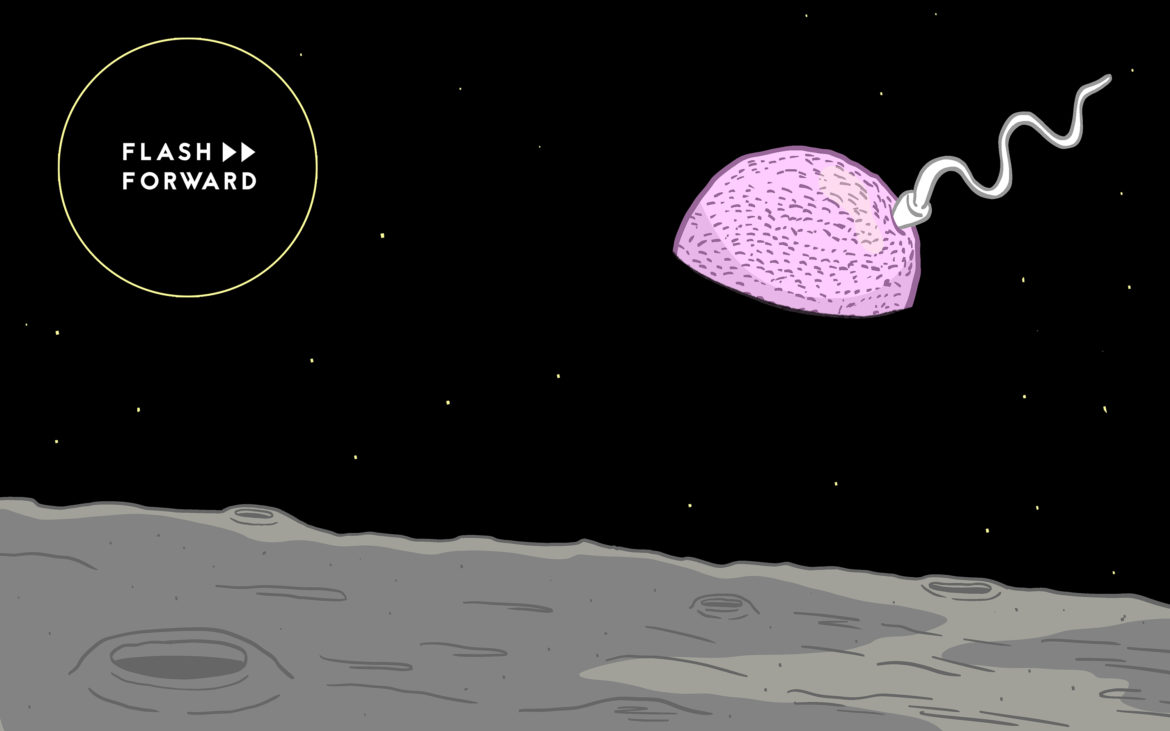
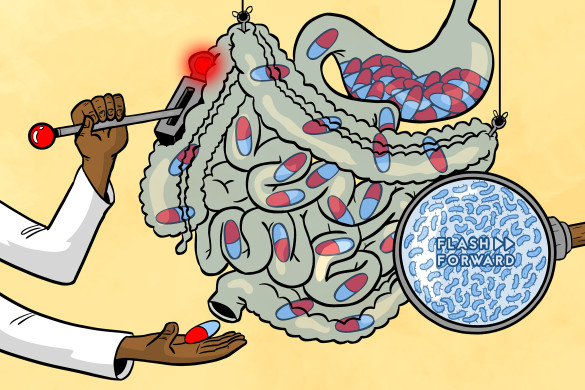
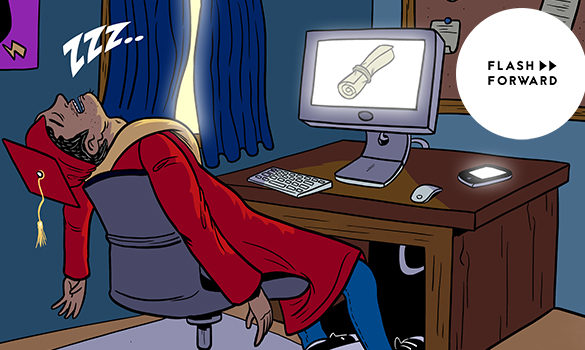

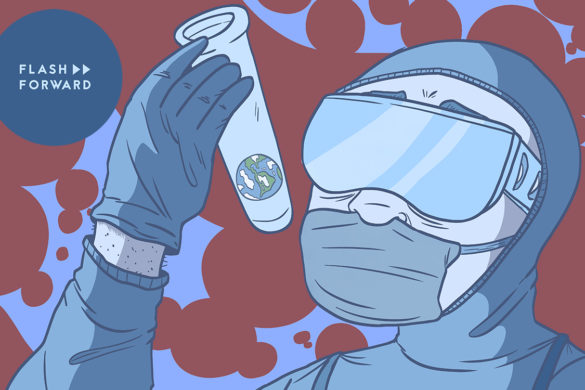

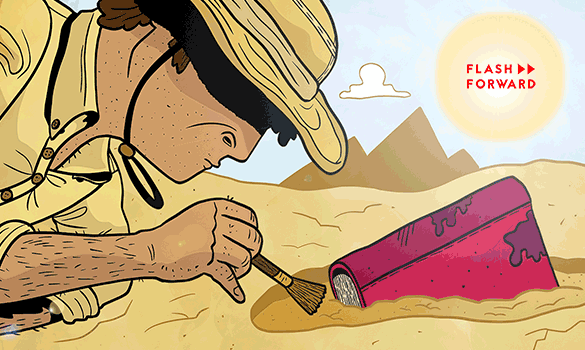
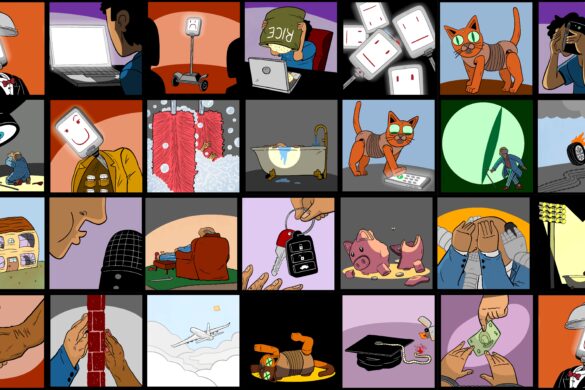
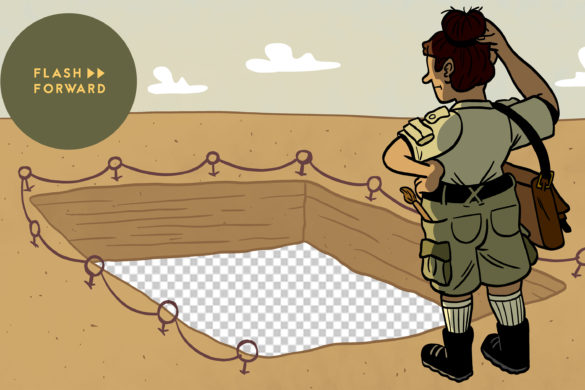
4 comments
[…] were once a staple of science fiction, from Dr. Who to Star Trek to the Jetsons, and I recently did an episode of my podcast Flash Forward about the dream of replacing food with capsules. Turns out, food pills are basically impossible to […]
[…] been once a staple of science fiction, from Dr. Who to Star Trek to the Jetsons, and I latterly did an episode of my podcast Flash Forward concerning the dream of changing meals with drugs. Turns out, meals drugs are principally […]
[…] What To Expect When You’re Expecting In Space […]
[…] heard Anicca a while back, on the episode about whether we can have babies in space, and she’s back to now […]